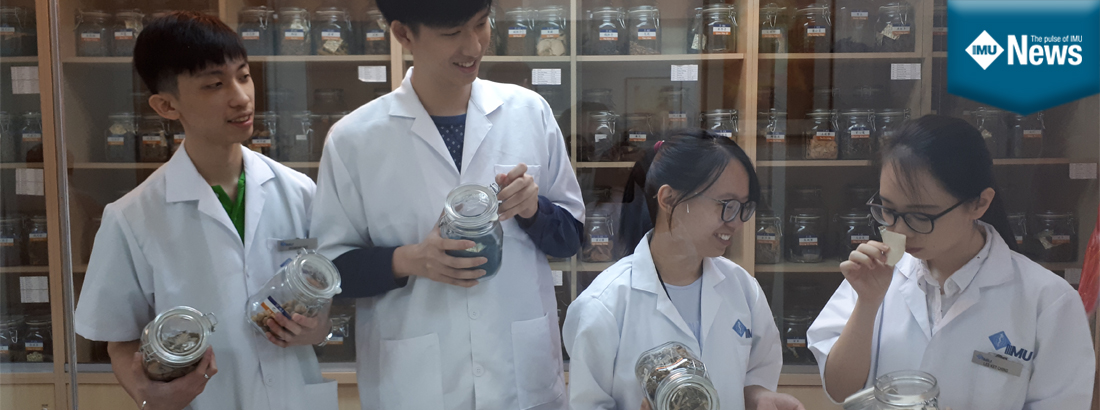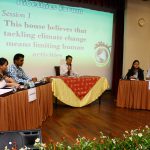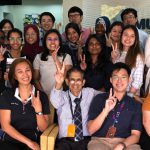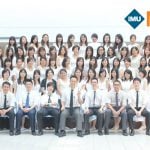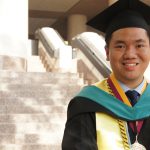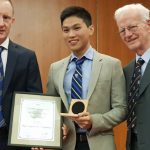An IMU alumna, Freya Tang Sin Wei, is currently a lecturer at her alma mater. She shares with us how she decided to study Chinese Medicine and her journey from then till the present day. Growing up with chronic illness, I was not a stranger to Chinese herbal medicine. The astounding effects of Chinese medicine had amazed me as a child, and I was very curious to learn about it. One night many years ago, my mother asked me “Do you want to try studying the Chinese Medicine programme at IMU?”. This is something that I can still recall vividly after she discovered an advertisement in the newspaper about the programme. Without much hesitation, I answered yes and that started my journey in pursuing my Chinese Medicine career. The years of studying my undergraduate degree at IMU were challenging yet fruitful. The knowledge and experiences I gained had been beneficial to me until now. Besides learning in the classroom, there were plenty of hands-on practical sessions and attachments at Chinese Medicine Centres or hospitals which prepared us – students – to become independent and competent practitioners. I also had the opportunity to attend a one-week novitiate programme in Guangzhou arranged by IMU, where I was able to observe special acupuncture techniques such as apitherapy (bee sting acupuncture) and catgut embedding therapy. These experiences had helped me in my career path later on.
| What Happens After I Graduated from IMU? |
|---|
When I graduated from IMU in 2015, I decided to go to Shandong for a one-year clinical training programme, to gain more clinical exposure in China. Prior to this, I had a three-month gap, which I spent working as a herbal dispenser and clinical assistant in the Chinese Medicine Department of Lam Wah Ee Hospital Penang. I was able to familiarise myself with the job quickly, thanks to the clinical training during my studies at IMU. In Shandong, I was attached to the Shandong Province Chinese Medicine Hospital, spending about a month each in every crucial department – from acupuncture, paediatrics, gastroenterology, oncology etc., including the intensive care unit (ICU). I was exposed to both Chinese Medicine and allopathic medicine in terms of diagnosis, examination and management as practiced in China. During this period of time, my IMU lecturers still stayed in touch with me to keep up with how I am doing in China. Besides that, my IMU mentor, Dr Wong Zhi Hang, had given me plenty of guidance and advice via emails. 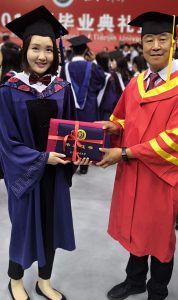 As I am more academically inclined, I continued to pursue my master’s degree in acupuncture and moxibustion at Tianjin University of Traditional Chinese Medicine (TJUTCM). I applied for the China Government Scholarship and was lucky enough to get it. During the three years in Tianjin, I pursued my postgraduate studies in acupuncture and moxibustion, and successfully completed my dissertation with my supervisor, Professor Xu Li (Dean, School of Acupuncture-Moxibustion, TJUTCM) and fellow colleagues. While training under my preceptors, I assisted them in translating what they taught to international students or fellow visitors. It was not difficult for me to do so as I had learnt Chinese Medicine in English during my bachelor’s degree at IMU. It was a great opportunity to share my knowledge in Chinese Medicine with people of different nationalities and professions, while learning from them about their healthcare professions such as homeopathy, traditional Mongolian medicine, anaesthesiology and allopathic medicine. This is what makes studying abroad a valuable experience – to meet people all around the world and learn from one another. As I am more academically inclined, I continued to pursue my master’s degree in acupuncture and moxibustion at Tianjin University of Traditional Chinese Medicine (TJUTCM). I applied for the China Government Scholarship and was lucky enough to get it. During the three years in Tianjin, I pursued my postgraduate studies in acupuncture and moxibustion, and successfully completed my dissertation with my supervisor, Professor Xu Li (Dean, School of Acupuncture-Moxibustion, TJUTCM) and fellow colleagues. While training under my preceptors, I assisted them in translating what they taught to international students or fellow visitors. It was not difficult for me to do so as I had learnt Chinese Medicine in English during my bachelor’s degree at IMU. It was a great opportunity to share my knowledge in Chinese Medicine with people of different nationalities and professions, while learning from them about their healthcare professions such as homeopathy, traditional Mongolian medicine, anaesthesiology and allopathic medicine. This is what makes studying abroad a valuable experience – to meet people all around the world and learn from one another. |
Just before my graduation, I was informed about the vacancy for a Chinese Medicine faculty at IMU. I applied and was recruited after I graduated with my Masters and returned to Malaysia. Now, here I am, working as a lecturer at the University that I have graduated from. Being back in IMU, I continue my journey to broaden my knowledge and to improve myself, as lifelong learning is what IMU-ians strive for!




